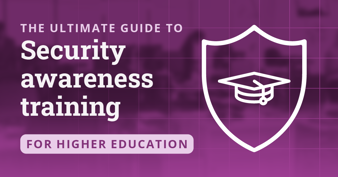5 Ways to Boost Engagement in Your Security Awareness Program
Gamification is everywhere, and with good reason. It’s proven to increase training engagement, something many businesses struggle to capture. A report from Gartner found 70% of business transformation efforts fail due to lack of engagement — security awareness initiatives included.
The first step to building an engaging awareness program starts with delivering your employees interactive and personalized content based on their roles. The next step is using learner performance data to drive engagement and behavioral change.
Phishing simulations & training
SecurityIQ’s new learner scorecarding lets you deliver personalized learning plans based on each employee’s security aptitude. It continually monitors 18 risk-related user behaviors including training completion rates, course participation, reported attacks and more to generate individual learner and departmental grades. As a learners’ grades change, their security training curriculum adapts accordingly.
Scorecarding data can also assist as you develop employee recognition programs and competitions to motivate positive security behaviors. Since all data is monitored and compiled automatically in SecurityIQ, you spend less time on administrative tasks and more on building learner engagement.
Here are five ways to motivate learners, increase engagement and improve results from your security awareness training:
1. Set Milestones and Goals to Reward Progress
Depending on how savvy your workforce is, it may take time to see major reductions in phishing susceptibility rates. While this may be your main goal, set milestones along the way to celebrate small victories. Track team and individual learner progress and congratulate them on achieving milestones and goals.
2. Hold a Competition
Department- or organization-wide competitions are a great way to gamify learning and motivate your workforce to complete training. SecurityIQ leaderboards make it easy to track competitions across groups or departments. You can base these competitions on a variety of metrics tracked in SecuirtyIQ, including.
- Most suspicious phishing emails reported
- Most courses completed
- Lowest phishing susceptibility rates
3. Highlight Individual Achievements
Reaching out to high-performing employees (either directly or through their managers) is an inexpensive and simple way to show learners you care. Send them an email, present them with a certificate or buy them a coffee to congratulate them on their performance.
4. Give Group Recognition to Motivate Underperformers
Group recognition for top-performing learners can be “a rising tide that lifts all boats.” Acknowledging high performers in a group setting can motivate underperforming employees to take action and improve their training results.
5. Publicly Foster Friendly Competition
One of the best ways to incentivize others to improve their security awareness is to publically recognize top-performing individuals or groups through competitions. Here are three ways to give public recognition to your top learners:

Get six free posters
Reinforce cybersecurity best practices with six eye-catching posters found in our free poster kit from our award-winning series, Work Bytes.
- Post leaderboards in the breakroom
- Announce winners in the company newsletter
- Give trophies to winners for cube-cred
About SecurityIQ
SecurityIQ integrates security awareness training, phishing simulations and personalized learning in one platform to drop organizational phishing susceptibility rates to as low as 0%. Learn more.








